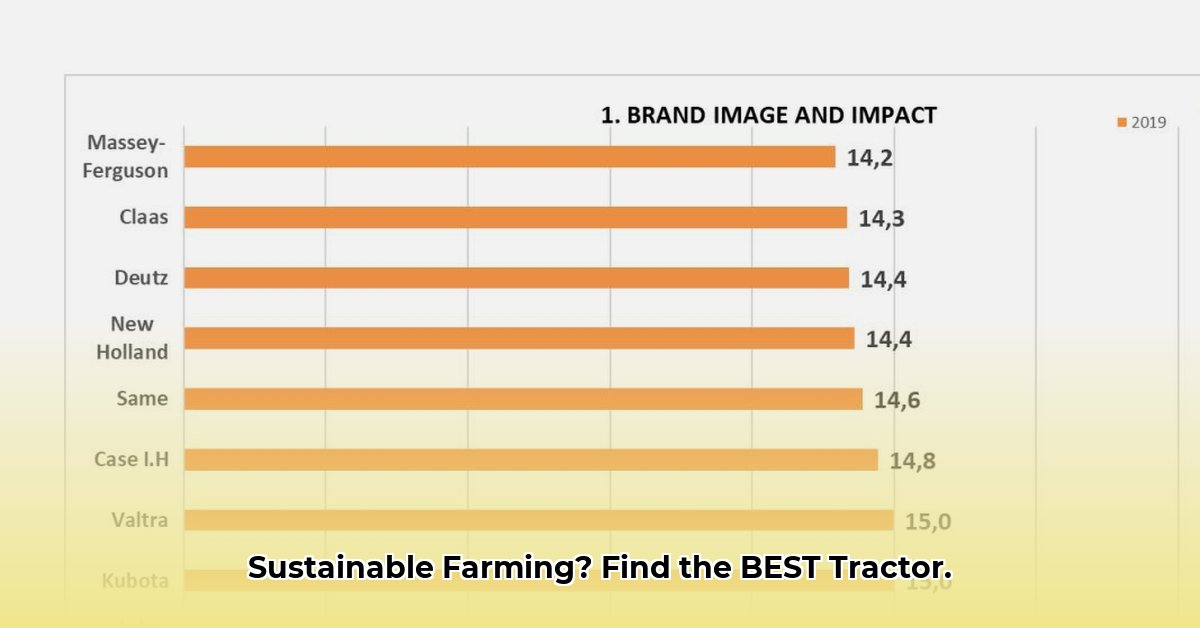
Choosing the right tractor is a pivotal decision for any farmer, impacting efficiency, sustainability, and long-term profitability. This guide helps you navigate the complexities of selecting a reliable tractor, comparing leading brands and providing a step-by-step process for informed decision-making. For more on tractor costs, see this helpful resource: Tractor Costs.
Top Tractor Brands: A Comparative Analysis
Several brands consistently rank highly for reliability. Let's examine John Deere, Kubota, Mahindra, Yanmar, and Kioti, highlighting their strengths and weaknesses.
John Deere
Pros: Extensive dealer network ensuring readily available parts; reputation for innovative technology and generally robust build quality.
Cons: High purchase price; some concerns about the long-term durability of aluminum rear housings on certain models under heavy continuous use. This is a crucial consideration for farmers demanding high-intensity usage.
Kubota
Pros: Wide range of models; excellent reputation for reliability and maneuverability, particularly in compact tractor segments; often praised for user-friendliness and performance.
Cons: Generally higher price point.
Mahindra
Pros: Often provides good value; many older models remain operational, demonstrating longevity; supply chain issues have shown significant improvement in recent years.
Cons: Past reports of supply chain challenges in some regions; durability can vary across models, necessitating thorough research for specific model selection.
Yanmar & Kioti
Pros: Solid reputations for compact utility tractors; generally offer good performance and reliability for smaller farms.
Cons: Parts availability and service accessibility may be less consistent than larger brands, depending on location. Thorough investigation of local dealer support is essential.
Key Factors to Consider When Choosing a Tractor
Brand selection is only one piece of the puzzle. Several other factors are crucial:
Budget: Establishing a clear budget is paramount. Include not only the purchase price but also insurance, maintenance, fuel, and potential repair costs. Are you prepared for the potentially higher repair and maintenance costs associated with some brands?
Farm Size and Needs: The scale of your operation dictates the necessary horsepower and capabilities. A small farm may suffice with a compact tractor, while a large-scale farm requires a more powerful machine with greater capacity. What are the primary tasks your tractor will perform?
Intended Use: The specific tasks your tractor will perform directly influence required features and capabilities. Are you primarily performing fieldwork, hauling, or a combination of these tasks? This will inform the horsepower and attachments needed.
Local Dealer Support: Reliable and responsive local service is indispensable. A readily available dealer network ensures timely repairs and parts replacement, minimizing downtime. Is there a reputable dealer within reasonable proximity to your farm?
Parts Availability: Easy access to parts is paramount for minimizing downtime during repairs. Does this brand have a reliable supply network near you?
A Step-by-Step Guide to Tractor Selection
Research: Explore online reviews, compare brands and models, examining specifications and features. Do your research before visiting dealerships to focus your inquiries.
Visit Dealerships: Engage with local dealers, ask detailed questions about maintenance, parts availability, and service response times. Don't hesitate to ask about past repair experiences from other customers.
Test Drive: Test drive multiple models to assess handling, power, and comfort. If possible, simulate conditions mirroring real-world tasks on your farm. Pay close attention to the tractor's functionality within your environment.
Calculate Total Costs: Consider total cost of ownership (TCO), including purchase price, insurance, fuel, maintenance, and potential repairs. Factor in long-term expenses to avoid surprising costs along the way.
Make Your Decision: Select the model best suited to your needs, budget, and local support structure.
Tractor Maintenance for Optimal Reliability
Regular maintenance is crucial for extending your tractor's lifespan and minimizing costly repairs.
Oil Changes: Adhere strictly to the manufacturer's oil change schedule.
Fluid Levels: Regularly check and maintain appropriate levels of coolant, hydraulic fluid, and transmission fluid.
Belt and Hose Inspection: Regularly inspect belts and hoses for wear and tear, replacing them proactively.
Preventive Maintenance: Follow the manufacturer's recommended maintenance schedule.
Conclusion: Choosing the Right Tractor for Sustainable Farming
Selecting the most reliable tractor depends heavily on your individual farming operation. A thorough research process, including test drives and comprehensive cost evaluation, ensures a decision aligned with your specific requirements and budget. Remember, the long-term sustainability of your farm is intertwined with the reliability of your equipment. Invest wisely.